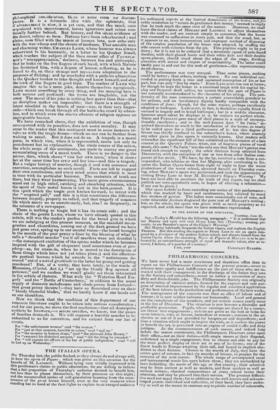THE ITALIAN OPERA. • ON Thursday last, the public flocked,
as they always do and always will, to hear the opera of Figaro ; which was given on this occasion for the benefit of M. LAPORTE. Without being very vividly impressed with this gentleman's claims to public admiration, we are willing to believe that a fair proportion of Thursday's audience desired to benefit him, not less than to please themselves, by their presence on this night ; and the uncontrolled smiles of self-gratulation beaming from the coun- tenance of the great lessee himself, even at the very moment when standing hat in hand at the footlights to explain to an enraged audience
his unfeigned regrets at the limited dimensions of his house, and his noble resolution to " return de gentlemen deir money," seemed to imply
that he took much the same view of the matter. However, we shall leave the rival claims of MOZART and LAPORTE to adjust themselves with the reader, and are content simply to announce, that the house was crammed to suffocation in every part, and that the usual, but, as
it appears to us, most inconvenient and improper method of disposing of the surplus population of the house was adopted, by stuffing the
side-scenes with colonies from the pit. This practice ought to be put down ; for it is not to be endured that a miserable squad of pale-faced dandies, with their glazed boots and their white kids and their double opera-glasses, should stand about the edges of the stage, dividing. attention with actors and singers of respectability. The latter could hardly pass in and out for this mob of gentlemen—this supernumerary ' dumb chorus.
The performance was very unequal. Than some pieces, nothing could be better; than others, nothing worse. No one individual suc- ceeded in putting forth a true and sustained conception of his or her part, but was only " tine by starts." Even LABLACHE was not at home; for though he kept the house in a continual laugh with his capital by- play and frequent droll sallies, we cannot think the part of Figaro is one naturally accommodated to the character of his acting. The pon- derosity of the man communicates a certain unavoidable grandeur to his actions, and an involuntary dignity hardly compatible with the conditions of farce; though, for the same reason, perhaps excellently adapted to burlesque. LABLACHE, in fact, is doubtless equally fitted to succeed in tragedy and in broad burlesque ; but in a middle character, however much talent he displays in it, he realizes no perfect whole. Gann and PERSIAN' gave many of their pieces in a style of unexcep- tionable excellence ; and in the well-known duet " Su l'aria," ac- quitted themselves so much to the satisfaction of the house, as nearly to be called upon for a third performance of it : but this degree of favour was chiefly confined to the subscriber's boxes, where scarcely any other piece in this opera is currently known. Our readers will remember the significant bill of fare submitted on the occasion of a late concert at the Queen's Palace, when, out of fourteen pieces of vocal music, this same " Su l'aria" was the only one that MOZART'S genius was found rich enough to supply ; the other thirteen being selected from DONIZETTI, with the exception of one or two from other Italian com- posers of less merit. [We have, by the by, received a note from a cor- respondent, who informs us that her Majesty, after continuing to fre- quent the Italian Opera-house from night to night to hear the worst productions of the worst school, absented herself on Thursday even- ing, when Mozawes opera was performed, and took the opportunity of visiting Drury Lane to hear 31. BENEDICT'S Gipsy's Warning! We have not been able to ascertain the truth of this report, but we shall publish our correspondent's note, in hopes of eliciting a refutation— if any can be given.]
Our space forbids its from extending our notice of this performance ; which was marked by haste and carelessness, but relieved by many fine strokes of genius. The ladies were occasionally out of tune, and some miserable foriture disgraced the pure text of Mozaar's writing; but, on the whole, the opera was given with as much propriety as we expected, and with more than we have sometimes experienced.
TO THE EDITOR OF THE SPECTATOR.
Tiairsday. June 21. SIR—To-day's Herald has the following paragraph " It is understood that her Majesty and suite will visit Drury Lane this (Thursday) evening, pri- vately, to gee Benedict's opera of the Gipsy's Warning." Her Majesty habitually frequents the Italian Opera, and neglects the English Theatres. But this evening she repairs to Drury Lane to see an opera com- posed by a foreigner of the modern Italian school, and absents herself from the Italian Opera when the charming Nozze di Figaro of Moz KT is to be per- formed by an extraordinary strength of vocal and dramatic talent, after an in- terval, I believe, of a quarter of a century !


























 Previous page
Previous page